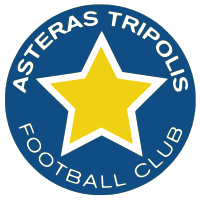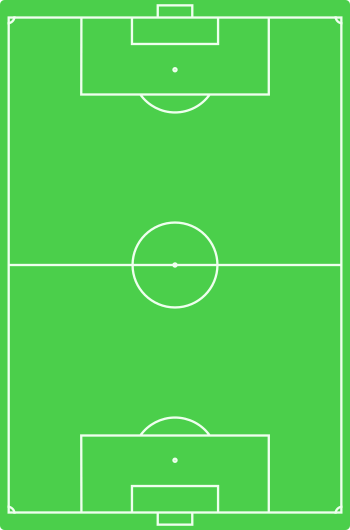Asteras Tripoli F.C.
 | ||||
| Full name |
Αθλητικός Γυμναστικός Σύλλογος Αστέρας Τρίπολης (Athletic Gymnastics Society Asteras Tripolis) | |||
|---|---|---|---|---|
| Nickname(s) |
"The Yellow-Blue" "Arkades" (Arcadians) | |||
| Founded | 1931 | |||
| Ground |
Theodoros Kolokotronis Stadium Tripoli, Greece | |||
| Capacity | 7,616 | |||
| Owner(s) |
Dimitris Bakos Giannis Kaimenakis | |||
| Chairman | Georgios Borovilos | |||
| Manager | Dimitrios Eleftheropoulos | |||
| League | Superleague Greece | |||
| 2015–16 | Superleague Greece, 7th | |||
| Website | Club home page | |||
|
| ||||
Asteras Tripoli Football Club (Greek: "Αστέρας Τρίπολης", transliterated "Asteras Tripolis", translated "Star of Tripoli") is a Greek football club from the town of Tripoli in Arcadia, Greece. The club was founded in 1931 and since the 2007–08 season, they have played in Superleague Greece, the top professional league in Greece.
History
Early years
Asteras was founded in 1931, in the area near Tripoli's railway station and was formally recognised forthwith. However, the club stayed inactive and during 1932 all football clubs in Tripoli were temporarily dissolved. At the same time, Minas Tsavdaris founded a football club and named it "Keramikos" after his home area.[1] Despite his efforts, Keramikos was never formally recognised, and in 1938 Tsavdaris decided to transfer all of the club's players to Asteras Tripolis, which was still legally recognised.[1] This signified the revival of the club and Asteras managed to compete in the inaugural season (1939–40) of the regional Arcadian League. However, the subsequent German occupation of Greece ended all league competitions abruptly and the club was dissolved once again.
Post-World War II
After World War II, Asteras was reformed under the name "Neos Asteras" and was accordingly recognised by Tripoli's courts on 23 June 1947.[1] Asteras won five consecutive titles in the Arcadian League (1957–62). The team won consecutive promotions and managed to play for two seasons in the Greek Second Division (1961–63), thus becoming the first team from Tripoli to ever participate in such a high division.[1] In the summer of 1963, Asteras merged with Aris–Atromitos and the new team was named "Athlitikos Omilos Tripolis" (Athletic Club of Tripoli, AOT). AOT's function was based in Asteras' statute and the new club continued its activities until 1968, when it was dissolved once again and was subsequently merged with Arcadikos to form Panarkadikos.
Recent history and era of success
Asteras was reformed again in 1978.[1] The club participated in the regional Arcadian League until 2003. At 2001 the club entered a new era and led an outstanding streak of performances. They remained unbeaten at home for over 5 years (from 2001 to November 2006) and they managed to move up four divisions, earning the promotion for the Greek Super League as Second Division champions on 12 May 2007.
Asteras made a spectacular start in their first season in the Super League. Their first ever win was against Panathinaikos (1–0[2] in Tripoli) and their first away win against OFI in Crete (3–0).[3] The season was marked by some outstanding performances with the most memorable being the 1–0 home victory against champions Olympiacos. They also managed to win 2–1 against AEK Athens and 2–0 against PAOK at home. Asteras Tripolis became the first and only newly promoted Superleague team that managed to beat Olympiacos, Panathinaikos, PAOK (home and away) and AEK Athens in its first ever appearance in the top division.
Coach Paulo Campos left Asteras on 24 February 2008 with assistant manager Panagiotis Tzanavaras taking over for the rest of the 2007–08 season. Asteras finally ended 7th, missing the European spot in the last games. In the summer of 2008 Asteras announced Carlos Carvalhal as their new manager. He was sacked in mid-season due to poor results which led the team near the relegation zone.[4] He was succeeded by former AEK Athens caretaker manager, Nikos Kostenoglou. In 2009 Asteras signed the Argentine former Internazionale assistant Mario Gómez as their new coach.
The 2012–13 season was the most successful in Asteras' history. They finished third in the Super League (and fourth in the play-offs), securing a place for the 2013–14 Europa League. Meanwhile, they reached the first Greek Cup final in their history, losing 1–3 to Olympiacos after extra time.[5]
Historical kits and Crest
Emblem versions

First
|
1978 [6]
|
2005–06 Gamma Ethniki winners [7]
|
2006–08 Beta Ethniki winners [8]
|
First match in Superleague Greece [9]
|
2008–09 Greek Cup Semi-finals [10]
|
|
2009–11 [11]
|
2011–12 Greek Football Cup Semi-finals [12]
|
2012–13 Superleague Greece 4th position
|
2013–14 [13]
|
2014–15 UEFA Europa League Group stage [14] and 3d position
|
Alternative
|
2005–06
|
2009–10
|
2012–13 Greek Cup Final [15]
|
2013–14
|
2014–15
|
Kit suppliers
| Kit provider | Period |
|---|---|
| |
2000s–06 |
| |
2006–12 |
| |
2012–present |
Stadium

Theodoros Kolokotronis Stadium (formally Asteras Tripolis Stadium) is a privately owned football stadium in Tripoli, Greece. Its capacity is 7,600. The stadium was renamed on 22 November 2012 in honour of the hero of the Greek War of Independence, Theodoros Kolokotronis. But the club proposed a new stadium, the New Asteras Tripolis Stadium
Superleague Greece record
| Season | League | ||||||||
|---|---|---|---|---|---|---|---|---|---|
| Div. | Pos. | Pl. | W | D | L | GS | GA | P | |
| 2007–08 | 1st | 7 | 30 | 11 | 11 | 8 | 28 | 24 | 44 |
| 2008–09 | 1st | 12 | 30 | 7 | 12 | 11 | 33 | 31 | 33 |
| 2009–10 | 1st | 12 | 30 | 10 | 6 | 14 | 29 | 36 | 36 |
| 2010–11 | 1st | 13 | 30 | 7 | 10 | 13 | 21 | 29 | 31 |
| 2011–12 | 1st | 6 | 30 | 13 | 6 | 11 | 30 | 34 | 45 |
| 2012–13 | 1st | 4 | 30 | 17 | 5 | 8 | 41 | 25 | 56 |
| 2013–14 | 1st | 5 | 34 | 16 | 10 | 8 | 46 | 35 | 58 |
| 2014–15 | 1st | 3 | 34 | 17 | 8 | 9 | 52 | 37 | 59 |
| 2015–16 | 1st | 7 | 30 | 11 | 8 | 11 | 31 | 30 | 41 |
Notable wins
European recordLast update: 10 December 2015
Notable wins
HonoursDomestic competitions
Divisional history in national level
PlayersCurrent squad
Note: Flags indicate national team as defined under FIFA eligibility rules. Players may hold more than one non-FIFA nationality.
Historical squadsAffiliated clubsPersonnel
Technical staff
Managerial history
References
External links
|
